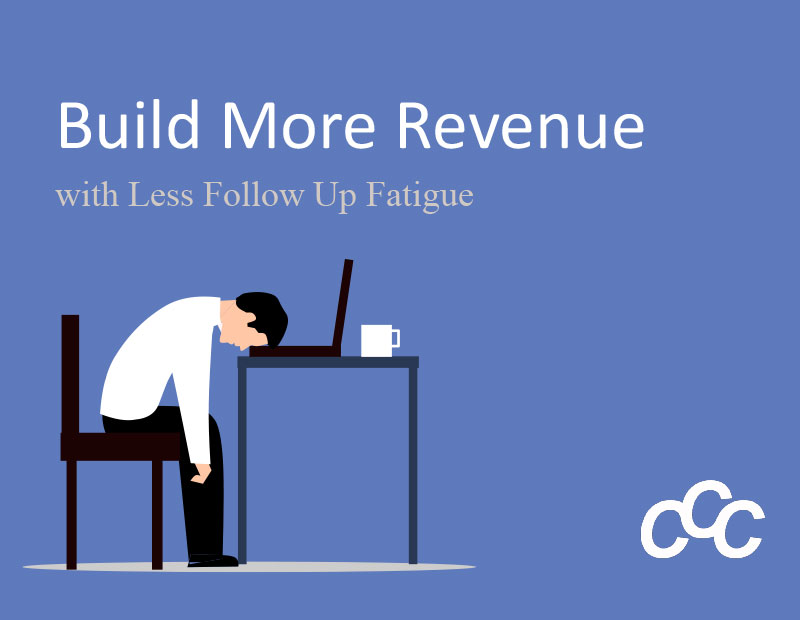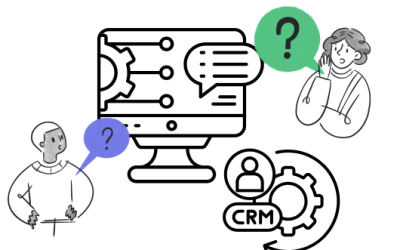Over the course of the last 18 months, we have written several articles about Follow Up Fatigue. It is a real issue that plagues business owners and salespeople. Some business owners and salespeople do not even realize that they are exhibiting signs of Follow Up Fatigue. They think it is just a part of the business. We are here to tell you that it does not have to be a part of your business and customer relation.
What is Follow Up Fatigue?
Follow Up Fatigue is when you spend most of your time following up with leads, both qualified and unqualified. You do not have time to improve your business and processes. Networking becomes a chore. Your interaction with your customers and team begins to suffer. Your life is consumed with follow-up and other areas of your life deteriorate. If you would like to learn more, you can read “What is Follow Up Fatigue and What to do About It.”
Pain points that produce Follow Up Fatigue
We want to share 4 pain points that, left unaddressed, can produce Follow Up Fatigue.
Inefficient sales and prospecting meetings
Sales meetings and prospect meetings with unqualified prospects can absorb way too much time. When a sales manager has to ask for an update from its salespeople, it is disruptive and wears down even the best salespeople. When the weekly sales meeting takes hours because salespeople didn’t fill out their reports, even more time is lost. When salespeople update their CRM and the sales manager sees the entries, sales meetings can focus on key opportunities and can be completed much more quickly
Spending time with unqualified prospects consumes way too much time, results in lower conversion rates and saps energy. Focus only on your “A and B” prospects and build your referral network to supply qualified leads. Reach out to less qualified prospects using personalized emails sent automatically by the CRM.
Good tips to reduce follow up fatigue from too many meetings include:
- Schedule a “No Meetings” day
- Block out time for important tasks so you are not interrupted
- Use your CRM as a communication tool to keep your bosses up to date, to track your own prospects, and to provide content-rich outreach as a primary means to keep your message in front of your prospects in a personalized way.
A lack of follow-up process
When everyone on the sales team handles inquiries and follow-ups differently, Follow Up Fatigue is sure to follow. Why is this? Each team member only knows how to follow up their own way, so when one team member’s follow-up process overlaps (or gets in the way) with another team member’s, frustration arises for both the sales team and the prospect or customer. Sales teams must be on the same page, and they need to work together in a collaborative follow-up process.
Using your CRM is the best solution to help teams work together and be accountable. A CRM centralizes your sales funnel, processes, data, and reports. If you would like to learn more, you can read our article, “Three Ways to Bring Your Team Together with Your CRM.”
Bogged down with too many administrative tasks
Every job has those tasks that need to be done. Processing orders, email clients to nurture the relationship, updating lists with new contacts, and the list can go on. Being bogged down with administrative tasks can rob anyone of the time to do the important tasks. This leads to Follow Up Fatigue, but there is light at the end of the tunnel. Although administrative tasks must be done, they do not need to dictate your day. Here are a couple of suggestions that you may want to consider which will relieve you of the administrative tasks that need to get done.
- Use your CRM to set up and automate follow-up and nurturing messages to your contacts.
- Hire a high school student who wants to start getting business experience. By delegating tasks to them, you free yourself to do what is most important each day.
Marketing is too general
We know that inbound marketing is a great methodology to attract prospects and lead them to take action such as calling you, filling out a contact form, signing up for a newsletter, or making an online purpose. If we are not targeting our specific audiences with content that appeals to them, we are letting any and every lead in the door. Follow Up Fatigue sets in when we are following up with every lead qualified and unqualified, and, in our experience, when marketing is to a general audience, you receive more unqualified leads. Your marketing needs to appeal to your specific audience so that your leads are quality over quantity. To help you define your audience, we suggest the following:
- Create a persona of your buyer. A persona is a fictional representation of your ideal buyer. This representation is usually based on your best customers, CRM data, and social followers. A persona will help you drive your content and marketing to your ideal audience.
- Understand your customers. What is their problem or issue and how can you help them? Our article, “Practical Ways to Use Your CRM to Lead Customers Through the Customer’s Journey” can give insight to building the customer relationship.
- Use your CRM to segment your marketing to ensure that you’re sharing the best content for each audience. Segmentation can be used in email marketing, website content, and lead generation forms.
Conclusion
We all experience pain points as business owners and salespeople. However, there are practical things we can do to minimize pain points and, in turn, reduce Follow Up Fatigue. If you would like to ask us how implementing a CRM can help you reduce Follow Up Fatigue, please call us at 301-332-0613 or fill out the form, we would love to start a conversation.





